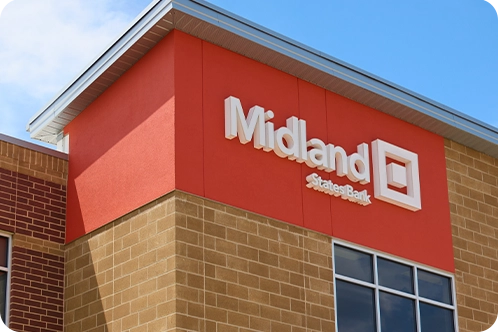
Refinancing Your Mortgage
Lower your rate, improve terms, or tap into your home's equity to get cash out.

At Midland, we know it only takes a moment for an idea to spark, to find your dream home, or to start planning for your forever. Whatever your moments are, we're here for them. Learn who we are.
Abigail, CustomerThey were responsive, calm, and attentive to all my questions as a first-time homebuyer. The process was simple, easy, and not stressful at all.
Paul Franco, CustomerThe process was straightforward and simple. I received a lot of support from the loan manager and staff. They addressed my concerns, helped secure a good mortgage rate, and made the process less stressful overall.
A rate and term refinance allows you to change the terms of your current mortgage. You can choose to refinance to the same or a longer term to reduce monthly payments or shorten your term to pay your loan off quicker.
With a cash-out refinance, you can tap the equity in your home to pay for home improvements, pay off higher interest rate debt, fund your child’s college tuition or whatever you can dream up.
An FHA Streamline Refinance allows you to refinance a current FHA loan into a new FHA loan to lower your rate or change your loan term. An appraisal is not required, and the credit guidelines are more flexible than other types of mortgage finances.
FHA Streamline Refinance Details
The VA Streamline Refinance program, also known as the Interest Rate Reduction Refinancing Loan program (IRRRL), allows veterans who are current on their existing VA home loan to quickly and easily refinance to the lowest fixed rate available, with little to no out-of-pocket costs.

It's best to get pre-approved before you start looking for homes. The pre-approval process will help you determine what price range you can and are willing to afford, strengthen your offer when you find a home you are interested in, and will speed up the closing process when you do decide to buy.

 New to Real Estate? Here’s How Investment Property Loans Work
New to real estate investing? Learn how investment property loans work and what you may need to know about financing a rental property.
New to Real Estate? Here’s How Investment Property Loans Work
New to real estate investing? Learn how investment property loans work and what you may need to know about financing a rental property.
 Need Cash for a Big Purchase? Compare Refinancing vs. Home Equity Loans
Looking to fund a big purchase by borrowing from your home’s value? You’ve got options. Explore home refinancing vs equity loan options including HELOCs.
Need Cash for a Big Purchase? Compare Refinancing vs. Home Equity Loans
Looking to fund a big purchase by borrowing from your home’s value? You’ve got options. Explore home refinancing vs equity loan options including HELOCs.
Our team of dedicated professionals are here to support you.